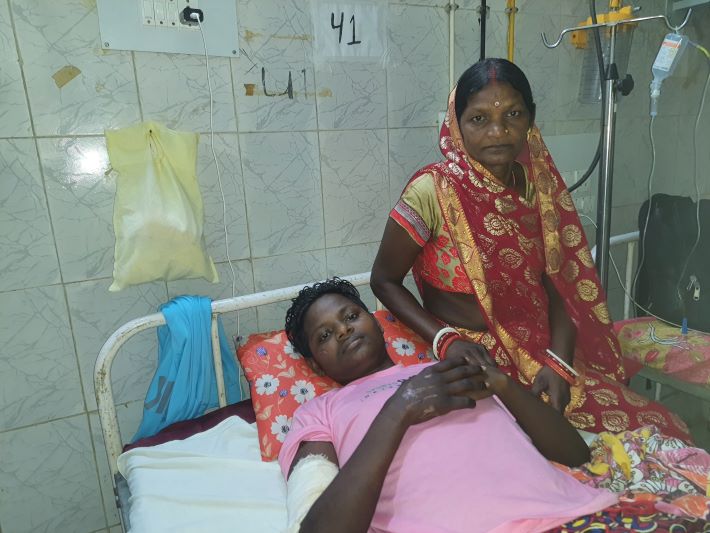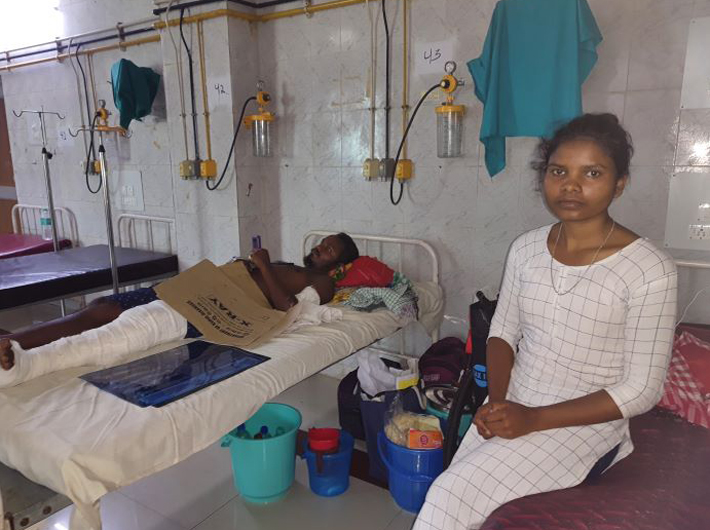In the hospital where survivors are recuperating, two teenagers share their tales
She’s a girl from West Bengal; he’s a boy from Bihar. They speak different languages, but they have a lot in common too.
They are both teenaged, students; they desperately wanted to earn to study, to get a certificate they thought would fetch them a job and an assured future.
They too had a dream: to save their families from the grip of perennial poverty.
Destiny, though, had other ideas.
The June 2 Odisha train disaster has shattered their dreams. Four weeks after the tragic accident, they are trying to piece together options left before them to bring their hopes back on the rails again. With hope against hope, they believe they can do it.
On a cloudy yet humid late-June afternoon, Gandheswari Mura, 19, is offering water to her brother Labir, 28, lying on a bed with thick layers of bandages around his leg at the SCB Medical College and Hospital (SCBMCH) at Cuttack, Odisha. Their father, Sashi Bhusan, 59, has gone out for lunch. Gandheswari will have her food here.
According to activist Mamata Pradhan, the hospital provides meal for one attendant of each patient. In the morning, like the last 23 days, Gandheswari and her father had ‘muri’ (puffed rice) for breakfast.
The wounds on other parts of Labir’s body have begun to heal. However, he has to wait for the surgery on his left leg, which sustained multiple fractures.
“We are leaving for home after an hour,” Gandheswari tells Governance Now. “Doctors have advised us to come after one month, only then will they take a call on my brother’s surgery. We have no option but to obey them,” says the tribal (Munda) girl from Sirugaru village in West Bengal’s Purulia district.
Elsewhere, a few buildings away, inside the trauma ward, 17-year-old Gautam Kumar stares at other patients occupying beds around him. Standing by him are his mother Nirmala Devi, 50, and brother Vikash, 24. They are natives of Rasonk village in Khagaria district of Bihar.
“Thankfully, my son has recovered from the injuries on his head. But we will have to stay here for at least, a couple of weeks, more,” Nirmala says, as her elder son Vikash looks on.

[Pic: Nirmala Devi by son Gautam's bed at the hospital: Photo by Debi Mohanty]
Gautam and Labir are among the survivors of the deadly rail disaster involving three trains- the 12841 Shalimar (Kolkata)- Chennai Coromandel Express, a stationary goods train and the 12864 (SMVB-HWH) Yashwantpur-Howrah Express at Bahanaga Bazar passenger halt in Odisha’s Balasore district on June 2.
That afternoon, they had boarded the Coromandel Express from Shalimar station in Kolkata.
Labir and Gautam are also among the 205 grievously injured who were rushed to SCBMCH hours after the accident. Already over three weeks have passed. A majority of the seriously injured have been discharged, while five succumbed to injuries (taking the death toll to 293). The condition of two injured in the ICU remains critical.
In between, throwing her eyes on her phone, Gandheswari narrates the tale of her family. Even in the age of tractors, for earning his living her father did what he knew – collected wood and made ploughs. With the meagre income, he tried to feed the family which includes, apart from the brother-sister duo and their parents, Sashi Bhusan’s younger unmarried sister. “You can’t imagine our difficulty,” she says.
The family’s financial condition forced Labir to work as a labourer. However, unable to find regular work in the vicinity of his village, Labir left for Kurnool in Andhra Pradesh, where he had been working as a mason for six years. On June 2, Labir was on the general coach of Coromandel Express on his way to his work place.
Though Labir sent some money every month, it was just not enough. “I wanted to study, complete degree course and get a job,” sharing her dreams Gandheswari continues, “During my tenth class, I pleaded for tuition in a few subjects, but we couldn’t afford.” Though she passed the matriculation exam in one attempt, her score was not good enough to find her a seat in the science stream, which she wanted to purse.
Left with no option she joined a local college and studied arts, and cleared her intermediate course in 2021. By then, Labir had married.
However, the same year, Sashi Bhusan was down with long sickness. When he was taken to the hospital, the doctor prescribed him medicines and long rest. Reason: Sashi Bhusan was affected by tuberculosis. Gandheswari says though her father has recovered after two years medication, he is too weak to take up any job.
Sashi Bhusan’s illness blocked Gandheswari’s chances of continuing her education. Against all odds, she managed the first year of her degree course, but couldn’t continue further.
In order to support her education, she left for Bangalore seven months ago. There she worked as a daily wager under a contractor at a monthly remuneration of Rs 12,000.
Apart from supporting her family she has saved some amount for her education. She too has bought the phone, which she says would help her clear doubts of some subjects of the course.
As soon as Gandheswari heard of the rail tragedy, she headed to the hospital where she has been camping all these days. She says her family will try to spend judiciously the Rs 2 lakh compensation they received from the railways.
Given that Labir may not be able to work for at least a few years to come, the entire responsibility of the family now rests on Gandheswari’s young shoulders.
She tries not to think much about the days ahead. "I will turn mad if I think about the future,” conceded Gandheswari.
At the moment, Gandheswari’s dream seems to have hit the dead end. She is unlikely to have the resources and time to compete her degree, soon.
However, mustering courage, she announces, “I will try to complete the course, one day. But, at present, I can’t say how and when I can achieve that.”
Gautam, on the other hand, tries to throw a faint smile on his innocent face, once in a while. He still cherishes the memories of the May 28 evening, when on his brother’s marriage he had danced a lot. Five days later, he set out to have his first brush with a long-distance travel that too in a “prestigious” train for a two-three-month trip to Chennai.
By his own admission, Gautam, who cleared his intermediate science examination with first division last month (he had got first division in matriculation too), had plans to move to Patna for coaching sometime in September. Before getting into serious studies again, he wanted to work as a daily wager and save money which would be of help in Patna. On the weekly-off days, he wished to visit the famous places in and around Chennai.
So, carrying his clothes and other essentials, as well as the roti and fry which her mother had pushed inside his bag, Gautam left, along with a few youths of his village – all migrant labourers. Both, his elder brothers, Vikash and Vivek who work as fitters, and their mason father, Janardan Sharma, 54, had given him some money. The entire family had also wished him luck.
Gautam can’t forget the delicious puri-bhaji (curry) he had in Kolkata before boarding the Chennai-bound Coromandel Express. He and his fellow village travellers had tickets for the general compartment.
However, they failed even to enter the crammed general coach. Ready to pay the required fine, they stepped inside a sleeper coach, which too didn’t have a single vacant seat. But, they managed to find space, stood near a door and travelled for four hours.
“At least we could breathe freely,” Gautam says, adding, “Bahut acchha lag raha tha, hamari train bhi khoob tej bhhag rahi thi (it was really enjoyable, our train was moving very fast).”
Their good times weren’t meant to last long, though.
A week after, Gautam, who couldn’t get a seat in the train, found himself lying on a hospital bed. By then his left leg had been amputed.
As activist Pradhan who has been working for the train accident victims asks whether he would try to continue his education, Gautam who is still a year away before he can cast his vote, looks at his mother. Within a few seconds, he replies, displaying amazing composure and confidence “Ho sakta hai science na ho, par padhna toh jaroo hey” (I may not pursue science, but will study surely).
His reply stuns Pradhan as tears well up in mother Nirmala Devi’s eyes.
